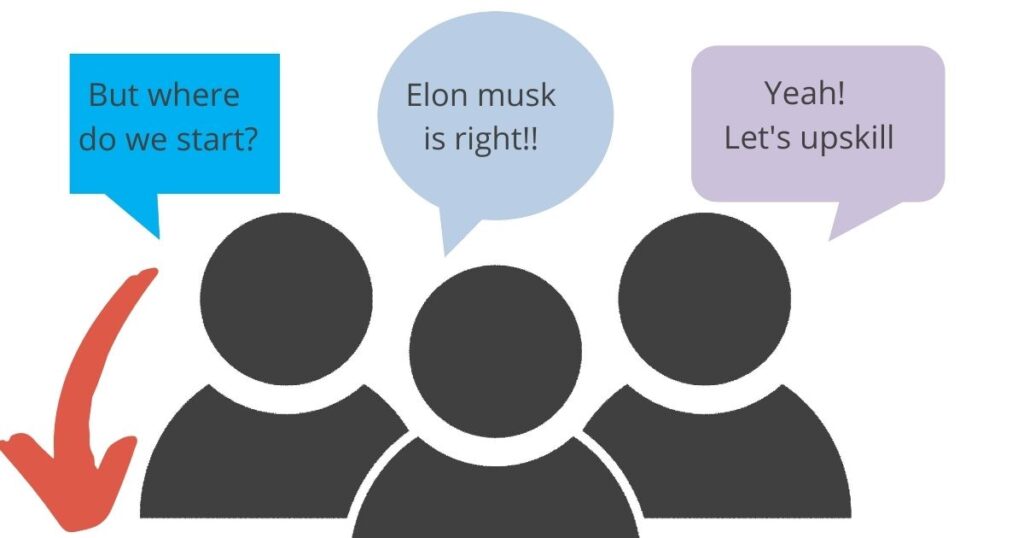|
|
This blog will talk about the benefits and uses of having a degree, how skills and degrees/certifications go hand in hand, and why there is so much importance given to skills.
We frequently hear employers, prospective students, entrepreneurs, and futurists saying that it’s all about the skills, not about the degree.
We can understand the conflicting thoughts- Do degrees really matter? Why do skills matter more than your degree? Is a University degree necessary for success?
Some of the best-known names in tech, from Bill Gates to Larry Ellison to Steve Jobs — decided not to graduate and carry out an ordinary way; the fact that greatness and gold-plated degrees don’t always go together seems hard to argue with.
They were confident and crazy enough to climb the ladder of success and reach the top; their skills made all the difference, not a degree!
Elon Musk to the Young and Ambitious: “Skills Matter More Than Degrees”

Is it really the scenario? Is it good career advice? Does that mean we should stop doing our degrees? Let’s find out!
Skill:
Every degree holder is not necessarily skilled. It is the skill that helps to achieve the target and not the degree.
Skill is an abstract term that cannot be evaluated on the bits of paper. It is a broad spectrum that is groomed within the individual and nurtured through repeated practical implications in life.
It is not the degree but the skill that achieves success. A degree can just earn the job, but it cannot help to grow further without the skill. It is a skill that attracts employers, clients, and management which lifts or drops the person. Without the skill, the person would not be able to catch the interest of their superiors and attain success.
The great people from the history were all skilled people, but they didn’t had the certifications for their knowledge.
Degree!!
A degree can earn the job, but it cannot help grow further without the skill. – It is a skill that attracts employers, clients, and time management which lifts or drops the person.
Degree and skills are two sides of the same coin, and a degree is nothing but the certified documentation of the skill within the individual.
The requirement of a degree depends upon personal interests, in some situations, you may need it as an entry pass for a job, but with changing times and work-from-home culture, skills are much more in demand than just having college degrees. That doesn’t mean you should throw it away if you have one. Having a degree is a plus in the job market.
Degrees do have their benefits, and we can’t deny that:
- It makes a person more confident in his approach and outlook.
- Going through a college degree can be an essential part of personality development.
- If you lack people skills, it can help boost your morale among people which will eventually help your professional life.
- A degree earns respect and a social reputation.
- Degree earns money and status for its master. The more specialized the degree, the higher the post and status, and the higher is the salary package.
- A person needs to have a degree/certification and the skill to succeed in the race of professional life.
Increasingly we hear this mantra: Skills, not degrees. It’s not skills at the exclusion of degrees. It’s just expanding our perspective to go beyond degrees.
So what you are saying is the right set of skills should be our primary focus, yes! But how do we demonstrate to the world that we possess specific skills and are capable of working and managing tasks with or without holding a degree, whether in a corporate or freelancing world?
The first is certifications, and the second is projects.
Read now: The 5 Most In-Demand Areas for 2022 Certifications
How to supplement your degree with the right skills?
When you could be working, earning, and gaining experience, does it make sense to spend all that time and money getting a degree? Do employers value real-world experience and on-the-job training enough to ignore the lack of a degree on a resume?
Companies are now sensing the pinch. For job openings, employers are no longer looking for white-collar or blue-collar workers, but, instead, “new-collar” workers: “an individual who develops the technical and soft skills needed to work in technology jobs through nontraditional education paths.
These workers do not have a four-year degree from college. Instead, the new-collar worker is trained through community colleges, software boot camps, professional certifications, technical certification programs, high school technical education, and on-the-job training and internships.”
Providentially, there are options to a traditional degree program that can help advance your knowledge and work experience.
Certifications will help you demonstrate your expertise and make you sound more credible.
Nowadays even School graduates can build a successful career with the right set of skills and certifications in hand without having a college education.
Virtual Learning and Up-skilling
Even before the pandemic increased the popularity of online learning, many people turned to certifications and degrees via virtual learning experience.
Bachelor’s degree can be earned from online colleges, that too with lower tuition costs.
Professional certifications, such as those offered by Coursera, edX, etc., can help you get new skills at an economical cost without going through a regular degree program. Udemy offers over 100,000 online courses taught by experts in their field, and LinkedIn offers many courses as well.
Companies often offer their own certification programs. For example, Google, Amazon(AWS), Microsoft, etc., offers programs in cloud architecture, DevOps engineering, and security engineering, and many other roles. HubSpot provides certification courses in Social Media and Marketing, Inbound Marketing, and Digital Advertising.PMI offers certification programs in project management, and this list can go on and on.
Read now: AWS-The Ultimate BEGINNERS Guide 2022
These Professional certifications not only increase your knowledge and skills in a particular domain but also help you land a high-paying job/promotion as well as boost employee morale.
Community College
Some companies accept two-year degrees from a community college if a candidate can demonstrate they have some of the desired experience.
One may still need to complete internships to gain additional experience, but they won’t have to spend nearly as much time (or money) on their education in a two-year program. And, when you complete community college, you’ll have an associate’s degree.
Besides community college, Online Communities are a great way of connecting with people and hearing and sharing all kinds of experiences. This experience helps future aspirants to understand different career opportunities better and make their career paths smooth.
The shifts in how we work, communicate, and learn will continue to evolve at a rapid pace in 2022. ReviewNPrep’s community of certified/professional users helps each other with preparation journeys and identifies trends through valuable discussion forums.

At times we get confused and find it difficult to decide as to which skill to acquire. Which skills are right for us, and which certification can help us learn that skill? Even if you have decided, confusing thoughts like where to start from? Which one to go for or is it suitable for me or not? It’s very natural to feel so.
Considering this issue, Reviewnprep came up with a tool known as career journey that can help you decide which certification is best suited for you.
We can all agree that there is always something to learn and improve on; we just have to find time for it.
Review N Prep came into existence from our struggles to get the right answers when it comes to studying for certifications in our areas of interest. There is a lot of information scattered on the internet and with so many resources, it became hard to navigate and read through it all.
The website was started with one goal in mind – to gather all the right tools that help us figure out the right strategy for a certification.
You can check the tool here.
Also, Listed down some latest beginner guides you may find helpful:
- Microsoft Azure Beginners Guide
- Google Cloud Certification for beginners
- Cybersecurity- The Beginners Guide
- Salesforce Beginners Guide
- Getting started with Scrum
- How to Prepare for CAPM Certification
We need your help! Please do leave your preparation journey if you have acquired any professional certification.
We believe that anyone who has taken the pain of going through the journey is proud of their achievement and is more than willing to share their experience so that others can benefit from their research. We also believe that anyone who has taken one certification is looking to enhance their expertise by taking the next level certification.
We firmly believe that everyone is a leader, and as a leader, it is our responsibility to help each other. We invite you to share your journey and also encourage others to share their journey too.
Re-imagining the future of skills: what do young people think?
In the present and future Right skills are given more value over academic qualifications as the nature of work and careers is changing fast.
The COVID-19 slowdown allows employers to reshape their hiring practices around this shifting workplace culture. How healthy companies can adjust their mindset will improve their future performance.
The future of work will not only be about hard skills; it will be about holistic job skills.
Companies look for more than just task-oriented or technical skills. They want people with an eye for detail, creative problem-solving skills, a collaborative mindset, time management skills, workplace skills, and an ability to deal with ambiguity and complexity. These, too, are skills that can be learned, often through apprenticeship programs.
We have spent the first third of our lives earning the college degrees we need to find jobs for ages.
And the other half of our career life acquiring skills required for a specific job indicating that the nature of our work, along with the skills and knowledge needed to execute it, remains unchanged for a lifetime – which, of course, is no longer valid.
Most of us have had several jobs and different career pathways, unlike our parents, who held one job for life.
According to the World Economic Forum, more than 1 billion jobs, nearly one-third of all jobs worldwide, is likely to be transformed by technology in the next decade. We already see this happen.
Think of the service staff at your favorite restaurant taking your order on a tablet connected to a central order-processing system back in the kitchen. The tablet must work without glitches to keep the restaurant running smoothly. Think of the apps you use to shop, track orders, and stay informed. The store needs to keep them up and running at all hours, day after day, all year round.
And because every one of these stores collects and maintains customer data that they study for trends – they need data analysts. They must also secure this data, which means they must therefore run cybersecurity operations.
This means an unusual and rapid increase in new kinds of digital jobs. There will be a rapid influx of roles at the forefront of the data and AI economy and new engineering, cloud computing, and product development roles. These jobs need talent with appropriate skills, and importantly these skills can be learned even by those without traditional degrees.
For any employee looking to earn a higher salary or move up the corporate ladder, they should study how their industry is unfolding, including recognizing specific skill sets in demand.
There are also nontraditional ways, such as certificate programs, boot camps, webinars, online non-degreed courses, conferences, and more.”
So which specific skills do today’s employers want to see in job candidates?
According to ZipRecruiter’s analysis of 250,000 of its job ads, the following six qualifications appeared most frequently:
- Communication skills
- Time management
- Ability to work well within a team
- Independent motivation
- Specific experience in Microsoft Office
- Ability to work in a fast-paced environment
Conclusion
Formal education is falling behind what employers now need is people with the right skills.
It is the skill that helps the person to grow up both materially / financially and immaterially concerning status, importance, social respect, recognition, etc. A degree has its reputation, as a person needs to have some skills to achieve the degree. A completely dumb individual cannot qualify to attain the degree. Hence, we can paraphrase that the degree can be the first step in the ladder of skills that leads to success in life, not the only one. Meantime, because of efficiencies created by the internet and new technologies, the global economy will look completely different soon, and half of today’s jobs will cease to exist. What’s left will be “new collar” jobs that require skills most earned through alternative pathways. And colleges aren’t built for it. The skills gap is a problem that requires everyone to rethink advanced education.


[…] Read also – What Matter More, Skills or Degree? […]